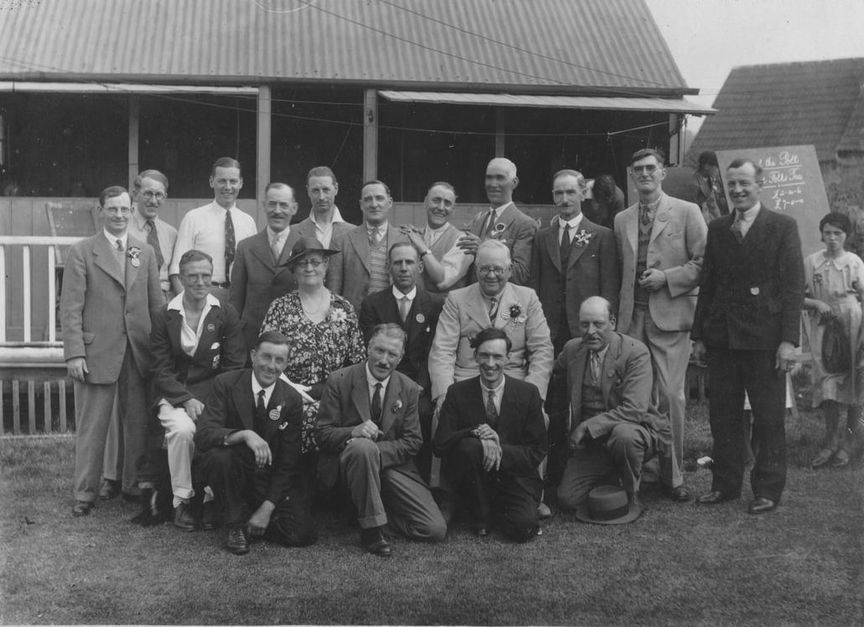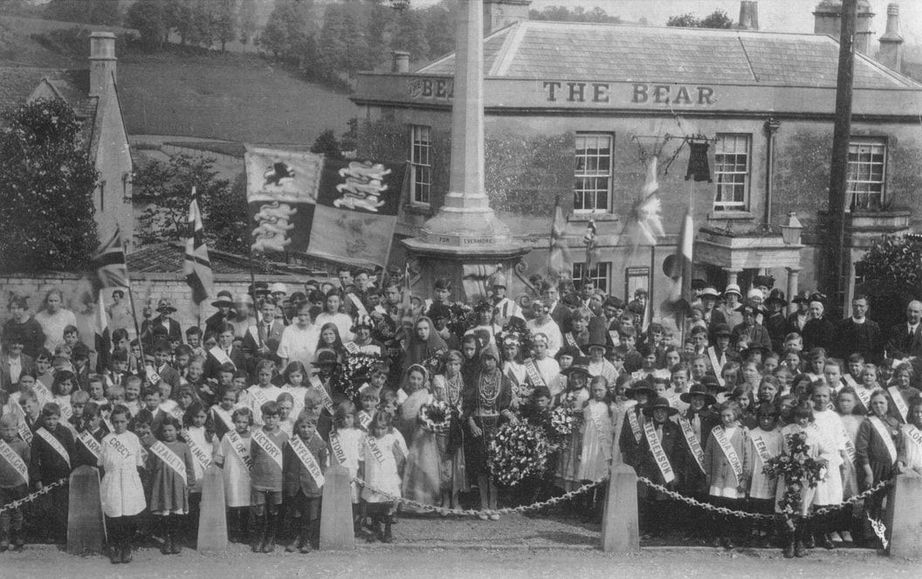The Lead-up to War Alan Payne December 2017
British families were still recovering from the horrors of the First World War when the prospect of a second war became apparent. In Box, the war memorial had only been completed in 1920 and the remembrance of the war was still active with parades around the memorial to commemorate the success of the Empire. People wanted a return to stability and to restore the order of the past but it was not to be.
Fascism or Communism?
The old measures of economic stability, employment and local self-sufficiency had proved inappropriate in the recession of the 1920s and the world struggled to find a solution to economic depression and mass unemployment. The failure seemed to be characterised by the inadequacy of the old Poor Laws which had existed since Tudor times. The old welfare system was reformed and diluted in the 1920s and people thought that the solution was international expansion.
It was argued that highly-centralised governments should intervene directly into economic activity through military investment and the abolition of wasteful, localised production which had failed. There seemed to be a stark choice between two systems: communism and fascism. Communism proposed a growing economy shared equally across all members of a classless society; fascism proposed growth headed by a single person and devolved down through ranks in society.
The economic problems of unemployment and social hardship in the 1920s hit Box particularly hard. The quarry industry had already been in decline and was brought to its knees by the building slump that followed the end of the Great War. The Parish Magazine was full of regret at the passing of the old social order of patronage and duty and there were worries that the increasing militancy of the trades unions would end in a Red Revolution of communists.
Against this background, some people in Box considered alternative political systems including fascism. The Vicar's Notes in the Parish Magazine of June 1925 tell, in a remarkably uncritical tone, of attempts to start a local branch of the British Union of Fascists, also known as Blackshirts and later the New Party. A meeting was held at Rudloe Park where the chief speaker was General Blakenby: (He) inspired his audience with enthusiasm for this movement for the protection of civilisation. Many who were present (told) how deeply they were stirred by all that they had heard of the evils of Communism. Mr G Wilbraham Northey has accepted the post of OC British Fascists in Box and Ditteridge with Mr F Scott as local Organising Secretary and Recruiter.[1]
This predated Sir Oswald Mosley's British Union of Fascists by six years, ten years before Hitler came to power as German Chancellor and two decades before the Nazis planned the Holocaust (extermination of Jewish and other peoples). It would be wrong to judge these people with hindsight but, at very least, it is an indictment on the judgment of the people involved.
Threat of War
In March 1935 Germany began re-armament and a year later it invaded and re-captured the Rhineland. But war clouds arrived over Box as early as 1934. A League of Nations meeting was held in the Bingham Hall in November to discuss armament reductions and the use of sanctions to stop aggressors. Philip Lambert organised a ballot locally as part of a national referendum.[2] The Archbishop of Canterbury wrote about the Price of Peace and vicar George Foster wrote These days are very critical ... for international peace ... Hard work for peace and not for weak-kneed trembling is what should be one of the signs which men may see in us who profess to follow Christ who is the Prince of Peace.[3]
Fascism or Communism?
The old measures of economic stability, employment and local self-sufficiency had proved inappropriate in the recession of the 1920s and the world struggled to find a solution to economic depression and mass unemployment. The failure seemed to be characterised by the inadequacy of the old Poor Laws which had existed since Tudor times. The old welfare system was reformed and diluted in the 1920s and people thought that the solution was international expansion.
It was argued that highly-centralised governments should intervene directly into economic activity through military investment and the abolition of wasteful, localised production which had failed. There seemed to be a stark choice between two systems: communism and fascism. Communism proposed a growing economy shared equally across all members of a classless society; fascism proposed growth headed by a single person and devolved down through ranks in society.
The economic problems of unemployment and social hardship in the 1920s hit Box particularly hard. The quarry industry had already been in decline and was brought to its knees by the building slump that followed the end of the Great War. The Parish Magazine was full of regret at the passing of the old social order of patronage and duty and there were worries that the increasing militancy of the trades unions would end in a Red Revolution of communists.
Against this background, some people in Box considered alternative political systems including fascism. The Vicar's Notes in the Parish Magazine of June 1925 tell, in a remarkably uncritical tone, of attempts to start a local branch of the British Union of Fascists, also known as Blackshirts and later the New Party. A meeting was held at Rudloe Park where the chief speaker was General Blakenby: (He) inspired his audience with enthusiasm for this movement for the protection of civilisation. Many who were present (told) how deeply they were stirred by all that they had heard of the evils of Communism. Mr G Wilbraham Northey has accepted the post of OC British Fascists in Box and Ditteridge with Mr F Scott as local Organising Secretary and Recruiter.[1]
This predated Sir Oswald Mosley's British Union of Fascists by six years, ten years before Hitler came to power as German Chancellor and two decades before the Nazis planned the Holocaust (extermination of Jewish and other peoples). It would be wrong to judge these people with hindsight but, at very least, it is an indictment on the judgment of the people involved.
Threat of War
In March 1935 Germany began re-armament and a year later it invaded and re-captured the Rhineland. But war clouds arrived over Box as early as 1934. A League of Nations meeting was held in the Bingham Hall in November to discuss armament reductions and the use of sanctions to stop aggressors. Philip Lambert organised a ballot locally as part of a national referendum.[2] The Archbishop of Canterbury wrote about the Price of Peace and vicar George Foster wrote These days are very critical ... for international peace ... Hard work for peace and not for weak-kneed trembling is what should be one of the signs which men may see in us who profess to follow Christ who is the Prince of Peace.[3]

George V Jubilee Committee 1935. Back row standing L to R: J Abrahams, F Nowell, H Rothery, Mr Basinger, C Cox, H Armstead, Mr Vaughan, A Weekes. Seated Middle row: Rev G Foster, the Hon Mrs Shaw-Mellor, J Browning, CW Oatley. Crouching Front row: W Dermott, A Cogswell, N Martin and F Merrett (courtesy Margaret Wakefield)
There was national encouragement for king and country, which was reflected in local attitudes. In May 1935 the King’s Silver Jubilee Fund held an open-air church service at The Northey Arms Hotel attended by 500 people. The celebrations moved to the Recreation Ground where there was folk dancing, and people listened to the King’s Speech, The Empire Broadcast, on the wireless. In the evening there was a Chinese lantern procession and fireworks and Jubilee mugs were presented.[4] There were personal contributions to the festivities from the singer, Evelyn Laye, who entertained at The Northey Arms, which was owned by the actress, Miss Maisey Gay.[5]
In March 1936 a lecture was held at the Bingham Hall to promote Air Raid Precautions for the protection of the civil population in the event of gas attacks ... and the protection of buildings and property.[6] Within three years it was needed but the outbreak of war had been long anticipated by military activity in the village.
Social Attitudes on Outbreak of War
In some respects the area was still largely unchanged from Victorian times. The quarries had been substantially worked out but the masons' yards still had piles of stone waiting to be used. The influence of the lord of the manor continued despite the sale of substantial parts of the parish. On the appointment of Rev Elliot Inchbald to the living of Ditteridge in 1939, the gift of which is in the patronage of Mr Armand Northey of Cheney Court, the population of Ditteridge parish was given as 109 people and the living was worth £226 a year.[7]
People were still struggling to overcome the trauma of the First World War and in 1943 were still putting annual In Memoriam tributes to their family killed in the Great War.[8] In 1939 the vicar of Box, Rev Arthur F Maltin, who had served with the Australian troops in the fighting at Gallipoli in 1915-16, gave an address to the Fallen Anzacs who Sleep at Bath (Locksbrook Cemetery). Within a short time these memories were overtaken by current events and new tragedies.
In March 1936 a lecture was held at the Bingham Hall to promote Air Raid Precautions for the protection of the civil population in the event of gas attacks ... and the protection of buildings and property.[6] Within three years it was needed but the outbreak of war had been long anticipated by military activity in the village.
Social Attitudes on Outbreak of War
In some respects the area was still largely unchanged from Victorian times. The quarries had been substantially worked out but the masons' yards still had piles of stone waiting to be used. The influence of the lord of the manor continued despite the sale of substantial parts of the parish. On the appointment of Rev Elliot Inchbald to the living of Ditteridge in 1939, the gift of which is in the patronage of Mr Armand Northey of Cheney Court, the population of Ditteridge parish was given as 109 people and the living was worth £226 a year.[7]
People were still struggling to overcome the trauma of the First World War and in 1943 were still putting annual In Memoriam tributes to their family killed in the Great War.[8] In 1939 the vicar of Box, Rev Arthur F Maltin, who had served with the Australian troops in the fighting at Gallipoli in 1915-16, gave an address to the Fallen Anzacs who Sleep at Bath (Locksbrook Cemetery). Within a short time these memories were overtaken by current events and new tragedies.
References
[1] Parish Magazine, June 1925
[2] Parish Magazine, November 1934
[3] Parish Magazine, March 1934
[4] Parish Magazine, May 1935
[5] Victor Painter, Kingsdown Memories, http://www.choghole.co.uk/victor/victormain.htm
[6] Parish Magazine, March 1936
[7] Bath Weekly Chronicle and Herald, 28 January 1939
[8] Bath Weekly Chronicle and Herald, 14 August 1943 on the anniversary of the death of Private Tom Norris in 1917
[1] Parish Magazine, June 1925
[2] Parish Magazine, November 1934
[3] Parish Magazine, March 1934
[4] Parish Magazine, May 1935
[5] Victor Painter, Kingsdown Memories, http://www.choghole.co.uk/victor/victormain.htm
[6] Parish Magazine, March 1936
[7] Bath Weekly Chronicle and Herald, 28 January 1939
[8] Bath Weekly Chronicle and Herald, 14 August 1943 on the anniversary of the death of Private Tom Norris in 1917
